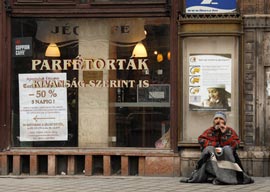
September 24, 2015

Budapest, Hungary
Source: Shutterstock
“This refugee flow has outraged the right wing,” Kenneth Roth, Human Rights Watch’s executive director, explained in an interview with The New York Times. “If you scratch the surface, why are they so upset? It’s not about jobs or the ability to manage them or social welfare. What it is really about is that they are Muslim.”
Hungarians might beg to differ. They might point out that multitudes of migrants”200,000 of them and counting this year”have forced their way into their homeland illegally. That most migrants have refused to be processed administratively (in cases even burning off their fingertips with acid so they couldn”t be fingerprinted), and thus no one knows who they are. And that they”ve been commandeering public places like an entire railway station in Budapest while demanding unhindered access to Germany, their stated destination, and treating Hungary as a mere pit stop.
Hungarians” bigotry, we”re told, has been on full display in several incidents. In a widely reported, if trivial, incident that took place at an improvised refugee center on Hungary’s border with Serbia, Hungarian police”visibly overwhelmed and out of their depth”began throwing bags of sandwiches to a scrum of Muslim migrants (young males them all) so that those at the back, including women and children, could also get some food. To make matters worse, some of the sandwiches weren”t halal! Cue global outrage. Alexander Spritzendorfer, a member of Austria’s Green Party whose wife had filmed the scene, accused Hungarians of treating migrants “like animals.” Presumably, he meant the method of distribution, but he could have meant the substandard quality of Hungarian sandwiches with their excessive lashings of paprika.
Inundated with thousands upon thousands of migrants (four out of five of whom have been men, with only an equally small percentage from war-torn Syria, whence these refugees have been said to be fleeing), local authorities allowed many of them to board trains for Germany. Yet the trains went only as far as Austria. This incident occasioned another Austrian, Chancellor Werner Faymann, to compare Hungarians” treatment of migrants to Austrians” own treatment of Jews during the Holocaust. “Refugees put on trains in the belief they are going somewhere else entirely brings back memories of the darkest period of our continent,” the Social Democrat politician explained to the German newspaper Der Spiegel. In other words, in Mr. Faymann’s reading of WWII history, Jews from the east were desperately trying to reach Germany so the Nazis could welcome them to the relative comfort of refugee centers only for these hapless Jews to end up being surreptitiously and unforgivably housed in Austrian asylum centers instead.
Then the Hungarian government went a step further and, after due warning, sealed the country’s border crossing with Serbia (through which tens of thousands of migrants had just passed illegally), leaving several thousand others stranded. When Hungarian authorities didn”t give in to their demands to be let through, the migrants”call them “refugees,” if you will”began chanting the Islamist cri de coeur of “Allahu Akbar!” pelting police with rocks, and trying to force their way through. (Bizarrely, the migrants also lobbed two young children over the security fence, injuring both of them.) To calm things down, local riot police decided to use water cannons and tear gas. Cue another round of global denunciations. UN Secretary General Ban Ki-moon professed himself “shocked” by the Hungarians” response, which he declared “unacceptable.” Apparently, stopping people from muscling their way into a sovereign state is now a human rights violation.
Sundry Western European politicians and commentators have likewise weighed in, sanctimoniously lecturing those benighted Hungarians, and other Eastern Europeans, about their lack of enthusiasm in the face of a seemingly unstoppable exodus of at times belligerent migrants from the Middle East, South Asia, and Africa. Yet it’s not hard to see why those routinely maligned Hungarians may be wary. Millions of them, in a country of less than 10 million, live hand to mouth in what counts as grinding poverty by Western standards, so they can be forgiven for being rather ambivalent about the prospect of having to shoulder the welfare needs of multitudes of new arrivals. The average monthly salary in Hungary is the equivalent of around $550, but many people, including teachers, earn half that. Even a cursory look at news reports will show you that most migrants look no more emaciated or scruffy than the locals, especially in rural areas. If anything, they seem better fed and dressed.
In a long-suffering nation that still hasn”t recovered economically from half a century of Communist misrule, which finally ended in 1989, impoverished locals include some one million Roma people (or “gypsies”), an ethnic minority whose fate doesn”t seem to weigh heavily on Western Europe’s much-vaunted conscience. The Roma arrived in Hungary with the Ottoman Turks, who ruled the country for a century and a half, between 1541 and 1699, during which period they laid waste to much of the land while massacring and enslaving locals for generations. Every day at noon church bells are still rung across Hungary in memory of the era. To this day most Roma have not been successfully integrated into mainstream society for a variety of reasons, not all of them ethnic Magyars” fault. Hungarians should perhaps be encouraged to work on further integrating the Roma before they”re expected to enrich their nation’s multicultural fabric with other needy minorities.